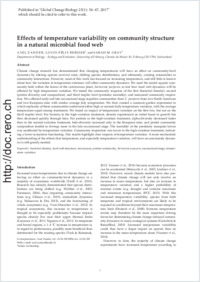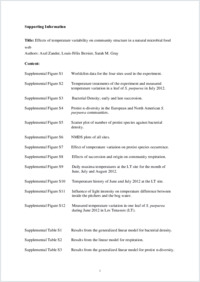Effects of temperature variability on community structure in a natural microbial food web
- Zander, Axel Department of Biology – Ecology and Evolution, University of Fribourg, Fribourg, Switzerland
- Bersier, Louis-Félix Department of Biology – Ecology and Evolution, University of Fribourg, Fribourg, Switzerland
- Gray, Sarah M. Department of Biology – Ecology and Evolution, University of Fribourg, Fribourg, Switzerland
-
01.01.2017
Published in:
- Global Change Biology. - 2017, vol. 23, no. 1, p. 56–67
bacterial density
food web structure
microcosm
protist community
Sarracenia purpurea
successional stage
temperature variation
English
Climate change research has demonstrated that changing temperatures will have an effect on community-level dynamics by altering species survival rates, shifting species distributions, and ultimately, creating mismatches in community interactions. However, most of this work has focused on increasing temperature, and still little is known about how the variation in temperature extremes will affect community dynamics. We used the model aquatic community held within the leaves of the carnivorous plant, Sarracenia purpurea, to test how food web dynamics will be affected by high temperature variation. We tested the community response of the first (bacterial density), second (protist diversity and composition), and third trophic level (predator mortality), and measured community respiration. We collected early and late successional stage inquiline communities from S. purpurea from two North American and two European sites with similar average July temperature. We then created a common garden experiment in which replicates of these communities underwent either high or normal daily temperature variation, with the average temperature equal among treatments. We found an impact of temperature variation on the first two, but not on the third trophic level. For bacteria in the high-variation treatment, density experienced an initial boost in growth but then decreased quickly through time. For protists in the high- variation treatment, alpha-diversity decreased faster than in the normal-variation treatment, beta-diversity increased only in the European sites, and protist community composition tended to diverge more in the late successional stage. The mortality of the predatory mosquito larvae was unaffected by temperature variation. Community respiration was lower in the high-variation treatment, indicating a lower ecosystem functioning. Our results highlight clear impacts of temperature variation. A more mechanistic understanding of the effects that temperature, and especially temperature variation, will have on community dynamics is still greatly needed.
- Faculty
- Faculté des sciences et de médecine
- Department
- Département de Biologie
- Language
-
- English
- Classification
- Biological sciences
- License
- License undefined
- Identifiers
-
- RERO DOC 279050
- DOI 10.1111/gcb.13374
- Persistent URL
- https://folia.unifr.ch/unifr/documents/305211
Other files
Statistics
Document views: 88
File downloads:
- ber_etv.pdf: 264
- ber_etv_sm.pdf: 144

